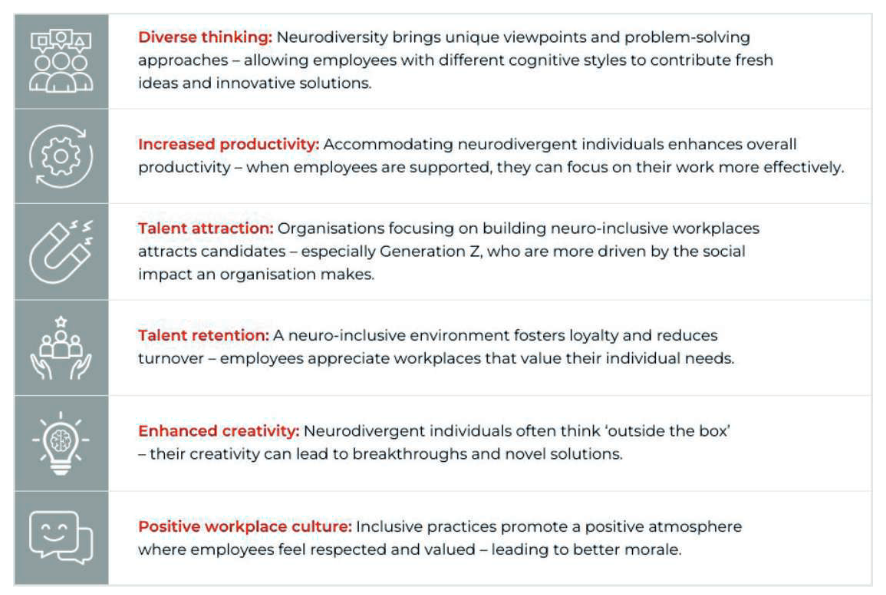September 2024
Jamie Lyon answers questions on why employers are starting to recognise the value the neurodivergent talent pool brings to the workforce.
What’s the background to neurodiversity in accountancy?
It’s estimated between 15%–20% of the population are neurodivergent. As a result, organisations have a moral responsibility to include and support neurodivergent individuals, creating workplace environments where everyone’s challenges are supported and strengths are celebrated, and where neurodivergent individuals can thrive.
ACCA’s latest report ‘Neurodiversity in accountancy’ explores the growing awareness by employers that those who are neurodivergent have real value to bring to an organisation. The report highlights targeted hiring programmes that have actively sought out neurodivergent talent to undertake specific roles.
How important is it that employers create workplaces that support the challenges of neurodivergent individuals?
Extremely important. Currently, the world of work clearly isn’t an environment in which many neurodivergent people can feel comfortable and succeed. It’s an issue that has historically gone under the radar.
Neurodivergent employees often bring different strengths and capabilities to the workforce, which benefits not only fellow employees, but the business as a whole.
ow can employers benefit from a more neurodiverse workforce? And are there any examples?
The business benefits for organisations that embrace neurodiversity include:

In our report, we share stories of individuals who are neurodivergent within the accountancy profession and, ultimately, celebrate thinking differently.
They represent organisations as diverse as accountancy firms EY and Cooper Parry, recruitment firm Michael Page Malaysia, HMRC and The Ritz London hotel. Numerous benefits to their organisations were cited, from brand recognition and winning new business to accessing previously untapped talent pools.
Bringing innovation, creativity and other valuable skills to the organisation was also recognised as a key benefit. Ultimately, a proactive approach in this area has an impact on creating value for an organisation, both financially and socially.
Why might there have been a reluctance in the past to embrace those who’re neurodivergent?
Possibly due to a lack of understanding of what it meant to be neurodivergent, and the different conditions this can represent. Medical research in the area also continues to advance, and the internet has played a role also in raising awareness. Social media has also been a force for good in terms of celebrities and high-profile figures openly embracing their own neurodivergence, or that of others. This has helped increase general awareness and elevated the issue in the workforce.
Are there any risks for employers who don’t embrace neurodivergent employees?
Ultimately, it’s about being able to recruit and keep hold of great talent.
Neurodivergent employees will often bring unique skills and talents to the enterprise, and as an organisation it’s very helpful to a recruitment brand if they are seen to be an inclusive organisation. So it’s a massive risk for employers in terms of talent loss if they don’t embrace this agenda.
Brand reputation aside, there is a moral imperative, too. Employers should aspire be seen to do the right thing here. If we look at the indicators through ACCA’s Global Talent Trends study, which is the largest worldwide annual study of workplace issues in the accountancy profession, what we know is that there is a mental health challenge in the workplace too. So having a much more inclusive approach to supporting employees and providing that duty of care is really the right thing to do.
Any final words of advice?
Supporting neurodivergent employees is essential for creating an inclusive workplace and this doesn’t need to be complex. Often knowing where to start can be the biggest challenge. Organisations can approach neuro- inclusion at both an organisational and individual level. The aim for any organisation should be neuro-inclusive design, where possible adjustments and ways of working are part of standard practice and no longer need to be requested.
- Jamie Lyon, Head of Skills, Sectors and Technology at ACCA



